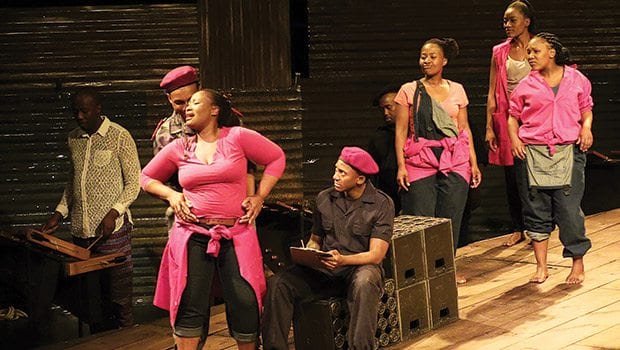Isango Ensemble’s touts the collective as key to company’s success

“Everything is done by the collective. You never get a sense of just one person doing one thing. It’s about the collective and we pride ourselves on that,” says Mandisi Dyantyis, associate director, co-music director and performer in the South African theater company Isango Ensemble.
The critically-acclaimed South African company, which made its U.S. debut in 2014 with Mozart’s opera The Magic Flute, wraps up its run of its two reimagined classics — “uCarmen” and “A Midsummer Night’s Dream” — this weekend at the Emerson/Cutler Majestic Theatre.
Dyantyis, who has been with Isango since 2006, states that “everyone has to sing, everyone has to play marimbas, everyone has to dance” in the company. “At some point you’re feeling insecure about something. At some point you’re dependent on someone.”
As associate director and co-music director, Dyantyis knows what each person who plays a role is capable of, what makes them tick. He pushes them to do more and also knows what makes them shine. The idea is to have all the members “do everything in the company,” he says. “I think if you picked us apart as individuals you’d realize that a lot of us are pretty weak, pretty average as it were. But when you put us together we’re formidable because we’ve gotten to know each other’s strengths and weaknesses. And we complement each other that way. A lot of our work is really based on knowing each other.”
In the reimagining of Georges Bizet’s famous opera “Carmen,” the members rotate in and out throughout as actors, as dancers and as musicians playing the marimbas. Even in auditioning for the company, the approach is simplified. The performers stand in a room and they’re expected to sing two songs unaccompanied — one classical, one African — in order for those casting to hear they’re voice, and to observe if the talent can use their ear. “If you can hear or if you’ve got a musical ear, you can function in a lot of musical situations,” says Dyantyis.
Based in Cape Town, the core of Isango Ensemble was founded in 2000 by artistic director Mark Dornford-May and co-music director and actress Pauline Malefane, who stars in the lead role of Carmen. The company predominately draws its performers from across the townships surrounding the city, and is known for their commitment to creating works that is accessible to all South Africans, that reflects the diversity of the country, as well as uniting its citizens.
“We try to make things as natural as they can because we really want someone who’s watched our show to live with a piece of us, to live with a piece of where we come from, to live with a piece of South Africa now,” says Dyantyis.
In the vivid and intense “uCarmen,” the audience is transported to a modern South African township to follow the story of Carmen: a strong, independent woman who knows her own mind and goes after what she wants. In this case it’s two men that she seduces, yet it comes with a price.
This is the second time that the South African company has tackled this production according to Dyantyis. “The return was always imminent. I was very excited and scared because the first production had really, really done well. Pauline does a brilliant job as Carmen and we wanted her to play it one more time.”
Of tackling Shakespeare’s comedy “A Midsummer Night’s Dream” the company wanted to do something that would appeal to a wider audience. And you have that with adapting Shakespeare’s work for the masses. “Shakespeare understood people more than all the writers that I know. He understood people’s behavior. Just people and so he wrote for people. And because of that, that’s what we do, explore people. He explores people. That’s why his writings will never lose their impact. When you read his stories you can actually reimagine it because it’s about you today,” sums up Dyantyis.






